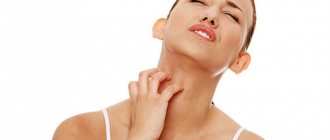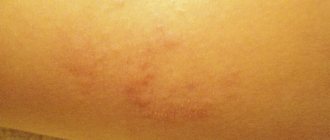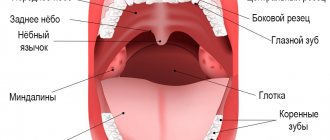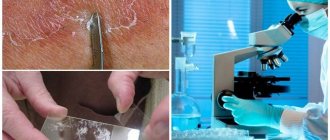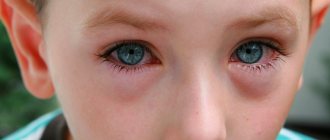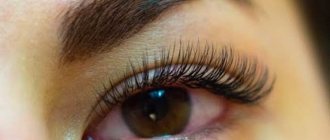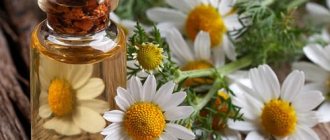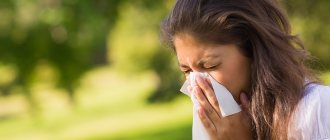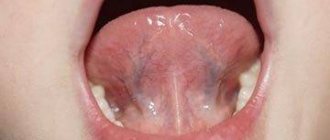Itching after a shower or aquagenic itching is manifested by a feeling of discomfort, pinpoint “tingling” of the skin, a burning sensation after contact with water, and its temperature can be any. Severe itching is sometimes accompanied by a urticarial rash (small blisters on the skin).
The nature of rashes due to urticaria varies
The following types are distinguished:
- Thermal urticaria or cholinergic. Occurs upon contact with hot water. After taking a shower, elevated dermographism (swollen red stripes that do not disappear for a long time) may be observed. Their appearance can be caused by: rubbing with a towel, exposure to jets of water on the body.
- Cold urticaria. After skin contact with cold water, pink or whitish rashes appear. They are dense to the touch, accompanied by itching, and can appear for several hours and then disappear without a trace.
- Aquagenic urticaria. A rare type of disease that occurs directly from water, the nature of the manifestation is similar to the first two types. It is believed that the effect of water on the skin causes a cholinergic reaction, as a result of which the amount of free histamine increases. There is also another hypothesis that the chemical acetylcholine is involved in the development of this disease.
Why does my body itch after a shower?
In most cases, unpleasant tingling sensations occur after using very hot water.
When the epidermis is heated, the capillaries expand, and the pores also become more penetrating. Accordingly, almost all salts and heavy metals found in water can penetrate the pores and cause severe irritation, a kind of allergic reaction. Why does your body itch after a shower?
- This usually happens after a person has soaked in the bath for a long period of time and then dried off with a hard towel.
- Often itching after a shower occurs due to the use of hard washcloths, as well as special braided products made from jute or hemp fibers.
- Occurs after using sisal washcloths. They are very rigid, so they can scratch the epidermis, resulting in irritation and itching.
- However, you should not be upset; you need to put such washcloths away and use them no more than once a week.
- Yes, indeed, it is necessary to get rid of dead cells on the skin, but you cannot do this every day.
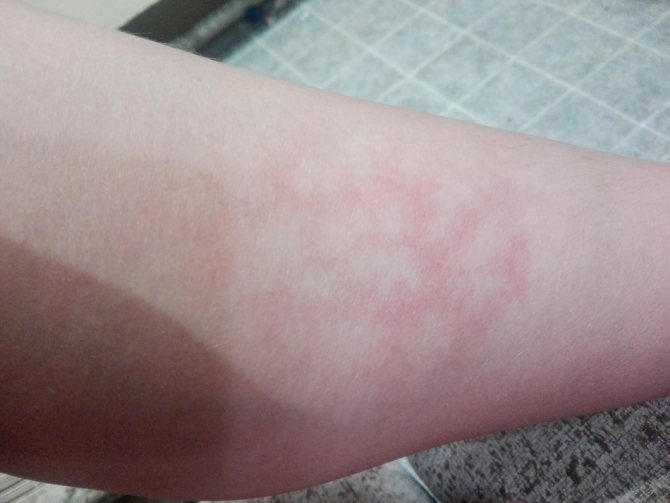
Another reason for severe itching after a shower is the use of aggressive cosmetics and detergents.
The body itches after a shower, reasons:
- Many people like to wash themselves with regular or laundry soap. These products are characterized by a high alkaline content, and their pH is much higher than 5.5.
- In laundry soap, the pH is approximately 8-9 units. This is a very high indicator, due to which the epidermis dries out greatly.
- To prevent this from happening, use products with an acidity of 5.5. This indicator is equal to the acidity of the skin, so there will be no irritation.
- Leave alkaline detergents for washing clothes.
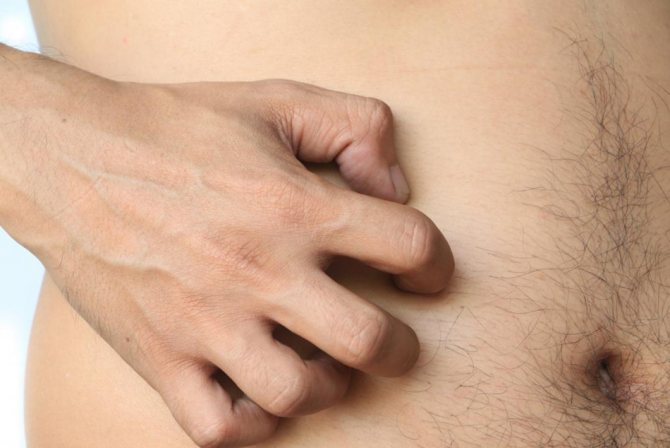
Severe itching
Often itchy skin does not indicate sensitivity to water at all, but the presence of a serious disease. The most interesting thing is that after taking water treatments, attacks of scabies, eczema, and dermatitis worsen. Therefore, if you rule out dermatitis and eczema, since you have never suffered from them, then it’s time to suspect a scabies mite.
If you have recently visited a bathhouse, sauna or swimming pool, you may well have contracted this disease. In adults, the disease may not be acute and may not produce any obvious symptoms. Itching usually appears immediately after drinking water. Please note that the skin is more likely to itch after taking a shower or bath in the winter.
What to do if your skin itches from hot water:
- This is due to the fact that in winter the ambient temperature decreases, and excessive sensitivity to cold may occur. In addition, central heating radiators dry the air, thereby drawing water out of the skin.
- Be sure to take care of moisturizers if you have very dry skin and use protective creams before going outside. This applies not only to the face, but also to other parts of the body that come into contact with air. That is, this is the neck, as well as the arms.
- If not only the face itches after taking a shower, but also the whole body, then the reason is in the water or excessive sensitivity to the salts that are dissolved in it.
- Of course, for adults, swimming in boiled water is not an option, so it is necessary to look for other ways to combat itchy skin. Below is a list of the most effective lotions and creams to help relieve itching after showering or bathing.
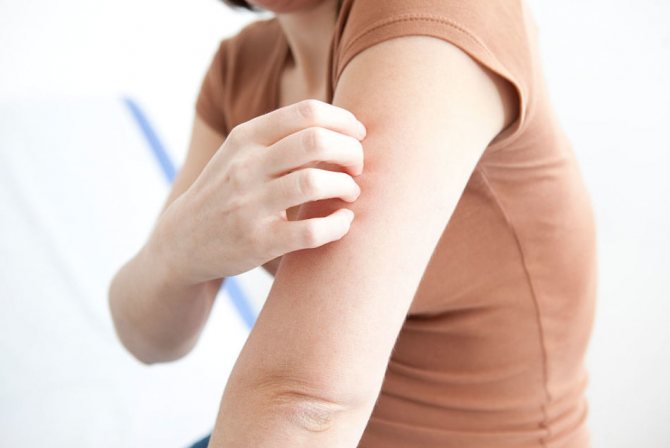
Unpleasant sensations
When should you see a doctor?

You should consult a doctor if the itching does not go away for a long time or gradually intensifies.
In most cases, the above tips, along with the use of moisturizers, help people combat post-shower itching.
However, for some people, itchy skin is not directly related to the skin. Certain medical conditions, such as nerve damage or multiple sclerosis, can cause overactive cutaneous nerves. Sometimes this causes the development of itching without a rash or other symptoms.
Itching, which develops as a result of diseases of the nervous system, often leads to excessive scratching of the skin, which can irritate it and increase the itching. In addition, violation of the integrity of the skin can provoke infections.
Sometimes excessive scratching of the skin can cause mental disorders, for example:
- depression;
- anxiety;
- obsessive-compulsive disorder;
- excoriation (skin picking disorder).
People who suspect they have a nervous or mental disorder should consult a doctor.
Disease as a cause of itching
Itchy skin after a bath is often considered a harbinger of serious problems. Standard options for dealing with the problem provide only temporary relief, since the cause remains unclear. Therefore, if body itching does not go away, an urgent consultation with a doctor is recommended.
In each specific case, an individual examination of the patient is necessary. Once the diagnosis is made, appropriate treatment is prescribed. Ointments, creams, injections and other methods are used as therapeutic agents. Prescribed medications help cope with the clinical manifestations of the disease.
It is very important to pay close attention to itchy skin. If the correct treatment is prescribed, the problem will soon disappear.
When your whole body itches after a shower, this can be a symptom of various diseases that can only be diagnosed in a medical facility.
- The skin may itch due to liver diseases, including jaundice, when a high content of bile acids leads to severe itching, especially after water procedures.
- Also, excessively irritated, dry skin can be a consequence of diabetes. Metabolic processes in the body are disrupted, dehydration occurs and the skin loses its elasticity, becomes rough and lifeless.
- Another cause of itching is disruption of the thyroid gland due to hormonal imbalance. Improper functioning of the endocrine system can cause any deviations from the normal functioning of the body, including problems of this kind.
- Common causes of a condition where any part of the body may itch after a shower are dermatological diseases. This symptom may occur due to skin lesions from lichen, scabies or other pathogens of focal rashes. Water procedures can aggravate the disease and spread infection throughout the body.
- Itchy skin can also be caused by helminths. By multiplying in the intestines, worms secrete a large amount of toxic products of their vital activity and cause allergic reactions, which are manifested by dry skin and rashes.
- A more rare form of the disease is aquagenic itching, when the skin begins to burn and itch under the influence of water. This condition usually goes away in a matter of minutes, but can last up to two hours.
- The water used may cause skin irritation. Very hard, with a high content of chlorine, it dries and tightens the skin, causing severe discomfort and the desire to scratch the body.
- Some washing products (soaps, gels) have a negative effect on sensitive skin due to the content of components that cause allergies or have a drying effect.
- Synthetic underwear is harmful to the skin. It does not contribute to normal heat exchange. The skin in such underwear does not breathe and does not absorb the moisture released.
- Allergies and itching of the skin after a shower can be caused by the powder used to wash the clothes. Most household chemicals contain compounds that are harmful to human skin.
- A pathological reaction after bathing may be associated with taking medications (medicines, contraceptives, etc.) containing certain irritants.
- Strong experiences and stressful situations can cause disruptions in the immune system. Itchy skin after a shower may be a consequence of such failures. This especially applies to people with an unbalanced psyche.
Itchy skin after a shower is a symptom of many serious ailments. Conventional methods of solving skin problems in this case bring only temporary relief, because the cause that causes them remains. Therefore, if the itching of the whole body or parts of it does not disappear, you need to go to the clinic.
Each specific case will require its own examination. The established diagnosis will determine the appropriate treatment. These could be ointments, injections or certain medications. The prescribed remedies will help get rid of unpleasant sensations.
Itchy skin after a shower is a signal that requires mandatory attention. With the right actions in such a situation, the problem will disappear.
Because You are not logged in. To come in.
Because you are not a trusted user (phone number is not verified). Enter and confirm your phone number. Read more about trusts.
Because The topic is archived.
Most of all it looks like a reaction to water. It’s just that it’s individual—we’re all different. and the composition of the water changes throughout the year. yeah.
Sometimes I also itch all over - creams rule. and sometimes what previously helped does not help - we experiment. ¶
In diseases, metabolic processes in organs are disrupted and metabolites are slowly eliminated. Thus, with liver disease and the development of obstructive jaundice, excess bilirubin and uric acids are concentrated in the blood and distributed to all arteries, arterioles and capillaries, including to the skin.
In the skin, such compounds come into contact with mast cells and provoke the release of histamine and other inflammatory mediators, which leads to unbearable itching, burning, hyperemia and scratching. Contact of such provoked skin with water (cold/hot) further enhances the synthesis of inflammatory mediators. A vicious circle arises.
Nosological units in which the body itches after taking a bath:
- diabetes;
- hyperthyroidism;
- excessive myeloproliferation – polycythemia;
- parenchymal, mechanical jaundice;
- dermatopathology – eczema of the palms, feet, psoriatic rashes;
- Scabies is a parasitic disease. The mite penetrates into the folds between the fingers and toes, upon contact with water, during a bath, and “buries” deep into the epidermis, which is why the skin itches more. Scabies can be contracted from a child visiting public places, such as a kindergarten or sandbox.
Skin itching as a symptom of diseases of internal organs and skin
The Itch Center has been created on the basis of the Clinic of Dermatovenereology and Allergology of the European Medical Center. Specialists from various fields provide outpatient and inpatient care to patients with acute and chronic itching. During treatment, the patient is offered a detailed examination in accordance with the protocol of the AWMF-Leitlinie (Association of Scientific Medical Societies in Germany) and European protocols for the management of patients with chronic itching.
The experience of highly qualified doctors, combined with a wide range of possibilities and examination methods at EMC, in most cases helps to identify the causes of itching, which, together with comprehensive, individually selected treatment, allows you to achieve maximum results from therapy.
In the literature, the term “itching” is understood as a sensation that causes a targeted scratching reflex. In the scientific literature, itching is also referred to as “pruritus” (from the Latin prūrio – to scratch). Often this phenomenon is one of the first symptoms of not only skin diseases, but also internal diseases, diseases of the nervous system, hormonal disorders and even tumors. That is why itching is currently regarded as an “interdisciplinary symptom” and in some cases even identified as a separate disease.
There are general (generalized) and local (localized) skin itching. Acute generalized - most often the result of food or drug allergies, reactions to cold, heat, etc. Often, generalized skin itching is a symptom of serious diseases: diabetes, diseases of the gastrointestinal tract, kidneys, malignant neoplasms, etc.
Localized itching occurs most often in the scalp and anogenital area and is paroxysmal in nature. The reasons for the development of this phenomenon in the anal area, as a rule, are considered to be chronic inflammatory processes in the pelvic organs, infections, incl. helminthic infestations, etc. Long-term sensations are often complicated by the development of a bacterial infection, candidiasis. Localized itching is also observed in the area of rashes in various skin diseases: psoriasis, atopic dermatitis, etc.
Frequency of development of itching in skin and systemic diseases
| Diagnosis | Frequency |
| Atopic dermatitis | main symptom, in 100% of cases |
| Psoriasis | 77-84% |
| Herpes zoster/postherpetic neuralgia | 58%/30% |
| Chronic kidney disease/dialysis | 22% |
| Primary biliary cirrhosis | 80% |
| Diabetes | 3% |
| Hyperthyroidism | 4-7,5% |
| Anorexia | 58% |
| Polycythemia vera | 48% |
| Hodgkin's lymphoma | 25-35% |
Itching that persists for more than 6 weeks is defined as chronic. Its frequency among the adult population is, according to research, 8-9%. Chronic phenomena are observed in various skin diseases (atopic dermatitis/neurodermatitis, eczema, prurigo, psoriasis, etc.) and systemic diseases.
Itching in various skin diseases
| Diseases often accompanied by itching | Diseases rarely accompanied by itching |
| Inflammatory dermatoses: atopic dermatitis, contact dermatitis, eczema, lichen planus, prurigo, psoriasis, seborrheic dermatitis, mastocytosis, lichen rosea, urticaria | Inflammatory dermatoses: scleroderma and lichen sclerosus, Devergie's disease |
| Infectious dermatoses: viral infections, impetigo, pediculosis, scabies | Genodermatoses: Darier's disease, Hailey-Hailey disease |
| Autoimmune dermatoses: bullous dermatoses, incl. Dühring's dermatitis herpetiformis | Tumors: B-cell lymphoma of the skin, basal cell carcinoma, squamous cell carcinoma of the skin |
| Tumors: Cutaneous T-cell lymphoma | Other conditions: scars |
Mechanism of development of itching
The mechanisms of development of itching in chronic kidney diseases are not fully known. The role of metabolic disorders is suggested, as well as the involvement of opioid receptors and increased skin dryness. Itching usually develops after 2-3 months. after the start of hemodialysis, in 25-50% of cases it is generalized, in other cases it is localized. As a rule, itching is most pronounced in the back and face.
In liver diseases, itching is a very common symptom (observed in 80% of cases of liver cirrhosis, in 15% of all cases of viral hepatitis C). As a rule, it begins in the area of the palms and soles, as well as in the friction area of clothing. It is characteristically intensified at night. Over time, the itching becomes generalized, and scratching the skin brings virtually no relief.
With endocrine pathology, for example, diabetes mellitus and hyperfunction of the parathyroid glands, itching may be accompanied by a burning sensation, tingling, or “crawling sensations.” A lack of vitamin D, minerals, and iron also in some cases leads to the development of this phenomenon. With iron deficiency, “aquagenic itching” (on contact with water) is often observed. As a rule, restoration of normal levels of iron and minerals leads to the disappearance of any sensations within 2 weeks from the start of therapy.
Itching can be one of the symptoms of tumors and blood diseases. Possible mechanisms of its occurrence include toxic effects, allergic reactions to tumor components, as well as direct irritating effects on the nerves and brain (in case of brain tumors).
Manifestations of the disease
- Polycythemia. The blood of people suffering from this disease contains a higher than normal number of white cells. During bathing, these cells release a special substance that irritates the skin.
- Jaundice. Bile acids, which are present in large quantities in the body during this disease, can accumulate in the skin, which causes a characteristic burning sensation.
- Graves' disease. In this case, the body may itch due to improper functioning of the thyroid gland. The condition of the skin is affected by a disruption in the normal secretion of hormones and other unfavorable changes in the body.
- Diabetes. With this disease, dry body skin and itching are observed due to metabolic disorders in the body. The skin loses its natural elasticity and becomes rough. It happens that when you are sick, certain parts of the body itch, often the legs.
- Scabies. The passages that the causative agent of this disease breaks through, and the products of its vital activity, irritate the skin, and the person itches, which is where the name of this disease comes from.
- Dermatological diseases. If the skin is affected by dermatitis, ringworm or another similar disease, it causes intense itching. In this case, you cannot use a washcloth - this is a direct path to infection of healthy areas of the skin.
- Aquagenic itch. This is the name of the skin reaction that occurs directly from contact with water. The characteristic burning sensation lasts from several minutes to two hours. The water temperature does not matter.
If after a shower your body itches and paresthesia is observed, then know that this is how aquagenic skin itching manifests itself. This reaction occurs even after short-term interaction with liquid. It may be with or without a rash. Itching appears in the first minutes after starting a shower or some time after hygiene procedures. The duration of this phenomenon ranges from a couple of minutes to a couple of hours, it all depends on the individual characteristics of the person.
True, there is a distinction between cold and heat urticaria - this is when itching occurs only from a liquid of a certain temperature.
A strong stream of water and vigorous rubbing with a towel can cause a similar phenomenon.
Aquagenic itch in the elderly is a type of disease that occurs after 59 years of age. Exacerbations are replaced by periods of rest, the disease becomes chronic. Senile xerosis appears. As a rule, exacerbations occur in winter; senile xerosis can be provoked by a sharp change in ambient temperature.
If your body itches a lot after a shower, this may indicate blood pathologies.
1. Multiple myeloma.
2. Mastocytosis.
3. Hodgkin's disease.
4. Lack of iron in the blood.
5. Erythremia.
Idiopathic aquagenic pruritus
Make an appointment by phone or by filling out the online form
The administrator will contact you to confirm your appointment. The Stolitsa Clinic guarantees complete confidentiality of your request.
The diagnosis of idiopathic aquagenic pruritus should be based on the following criteria:
- itching, tingling or burning sensation develops after contact with water, and its temperature can be different;
- itching occurs within a few minutes after contact;
- there are no visible skin changes;
- During the examination, chronic diseases of the skin or internal organs that could explain the appearance of itching were excluded; there is no indication in the anamnesis about taking medications;
- cold, thermal, cholinergic, aquagenic urticaria, urticaria from vibration and pressure, elevated dermographism are excluded.
- true polycythemia was excluded.
Based on these criteria, Steinman and Greaves described 36 patients suffering from aquagenic pruritus: 16 women and 20 men, ranging in age from 17 to 81 years. There were no cases of spontaneous remission of itching. Its duration ranged from 10 to 120 minutes. Some patients noted that itching occurred directly during swimming or taking a bath, while others, on the contrary, complained of itching only after leaving the water. In approximately half of the patients, skin itching was also observed in response to changes in ambient temperature: before going to bed when warming up in bed or when getting out of bed in the morning.
The vast majority of patients noted itching in the area of the legs and thighs, 70% of patients noted itching of the skin of the trunk and/or upper extremities. In approximately 1/3 of patients it began in the lower extremities.
For many patients, the itching was very intense, and some were unable to use the bath or shower at all. In 55% of cases it was accompanied by irritability or depression.
Itching may also be limited to the scalp due to diabetic neuropathy. There is no correlation between the severity of the disease and the intensity of the itching, but correcting the sugar level usually leads to its disappearance.
Diabetes insipidus and gout are rarely accompanied by itching. Rarely, generalized pruritus is associated with carcinoid syndrome. The cause of itching in this pathology may be the release of histamine or kallikrein by tumor cells, which, in turn, causes the secretion of bradykinin, as well as the vasodilating effect of serotonin. As with thyrotoxicosis, peripheral vasodilation reduces the threshold for the perception of itching.
Itching of the skin of the upper body is often observed in women during menopause and is associated with the so-called “hot flashes”. Diagnosis in such cases is based on determining plasma gonadotropin levels.
If you liked the material, share it with your friends!
What to do if your skin itches from hot water?
Severe itching
Unpleasant sensations occur after using a hard towel. It is recommended to use towels washed with softening agents. This can be conditioners, or a regular vinegar solution. This helps make the fibers softer and reduce irritation after water procedures. To avoid irritation and itching after water procedures, you must adhere to the following rules.

After a shower your body itches, what to do:
- The water temperature should be 37 degrees. The higher the heat, the greater the likelihood of itching.
- Use an emollient or shower gel containing natural oils. Tea tree oil is ideal for treating irritation and itching.
- It has antibacterial properties, does not dry out the epidermis, and allows it to be saturated with useful elements. Of course, while most people use filtered water for drinking, regular tap water is used for bathing.
- It, in turn, is saturated with heavy metals and contains a huge amount of salts, which increase its hardness. This composition negatively affects the condition of the epidermis, so if necessary, it is advisable to soften it.
- This can be done by adding a few tablespoons of baking soda to the bath. This will help soften the liquid and reduce the likelihood of irritation and inflammation after a shower or water procedures.
Redness
When bathing, add a product called lipikar to the water. It contains liquid paraffin, which creates a thin film on the surface of the body. This remedy is prescribed for atopic dermatitis.
Your skin itches after a shower, what to do:
- Any itching that occurs on the skin with this disease is associated with drying of the surface and rapid loss of moisture. Therefore, be sure to use protective equipment. Please note that salt draws water from the surface of the skin, so you need to use a salt bath for no more than 7 minutes.
- It is best to avoid taking baths containing salt altogether. Despite all the benefits, if sensitivity is excessive, it will increase. Often, after contact with water, red spots appear on the surface of the skin.
- They are called water urticaria and are a type of water allergy. Nothing bad will happen, but it will bring a lot of negative feelings. After a few minutes or 1 hour, any itching on the surface of the skin after drinking water goes away. However, to avoid provoking it, use emollients before and after taking a bath.
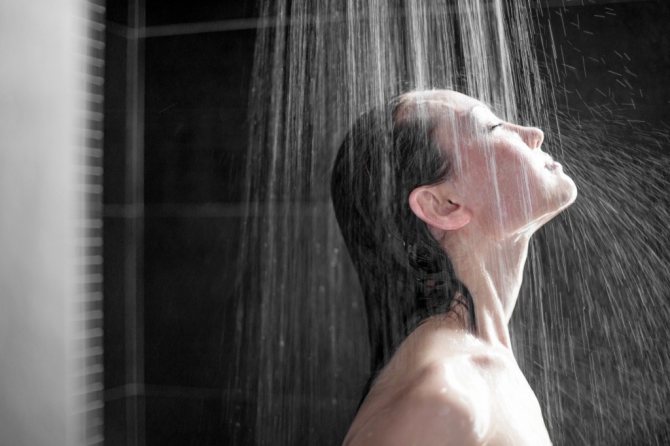
Water treatments
Allergy to water
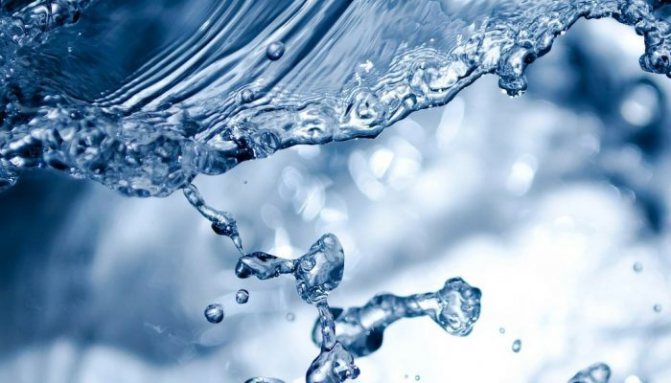
Individual intolerance to water is a rather rare condition, which, however, can cause great discomfort to a person. Some experts are confident that such an illness is not associated with an allergy to the liquid in its pure form, but with a reaction to certain of its components (in the case of tap water, these can be chlorine and other disinfecting additives, and with sea water, mineral and organic particles) .
An allergy to water is called aquagenic urticaria. This disease is an atypical skin reaction and does not cause serious changes in the body, nor does it pose a significant danger to health and life.
Symptoms
Aquagenic urticaria makes itself felt:
- Tangible discomfort after water procedures, which is represented by itching and redness of the skin.
- Possible redness of the mucous membranes.
- The appearance of a rash in certain places that are exposed to water. Most often, the skin becomes covered with a red, pinpoint rash or blisters, like a nettle burn.
- Irritation and drying of the skin.
- Various disorders of the digestive tract (not always).
- Urge to cough and nausea (also not in 100% of cases).
- Headaches.
Unpleasant symptoms of aquagenic urticaria most often disappear on their own literally an hour and a half after the skin stops contacting water (sometimes faster or longer).
The red spots on the body gradually disappear, the itching decreases in intensity and soon disappears.
How to treat aquagenic urticaria?
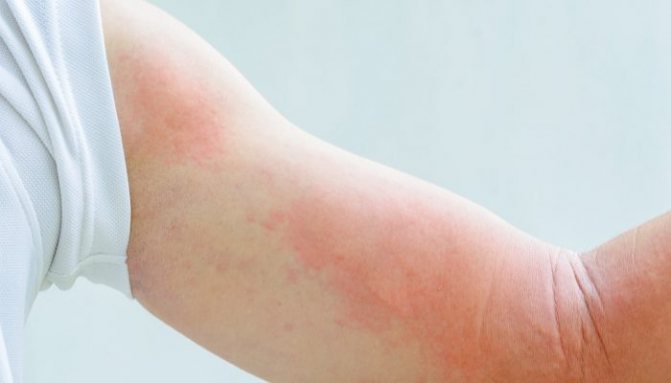
Anti-allergy medications will help reduce the severity of unpleasant symptoms or get rid of them as quickly as possible. The drugs of choice are usually:
At the initial appearance of unpleasant sensations, you can take any antihistamine that you have at home, in the dosage specified in the instructions. In the future, you need to consult a doctor: a specialist will select the optimal treatment regimen.
Typically, doctors advise patients with aquagenic urticaria:
- Install high-quality water filters or switch to using artesian water. Sometimes settling and boiling ordinary tap water helps to avoid the appearance of blisters.
- Reduce the time of water procedures to a minimum.
- Cleanse your face using other methods (not water). In particular, micellar water or milk can be a good option.
- Adhere to the healthiest lifestyle possible, organize a nutritious and balanced diet, pay attention to moderate physical activity and get good sleep.
- Apply the cream recommended by your doctor to the skin. This can be a regular hypoallergenic moisturizing product or a special medicine with antihistamine components.
- Wear comfortable cotton clothing and do not irritate or scratch your skin.
Most often, an allergy to water disappears as suddenly as it appeared. To do this, it is enough to completely change your lifestyle and general approach to hygiene.
What to do if itching occurs? Prevention methods
Helps to get rid of unpleasant sensations:
- Use of cosmetics. This can be a gentle cream after a shower or a special milk applied to a damp body. It is also useful to lubricate the skin with mild baby oil.
- Soothing warm baths. To eliminate itching after a shower, it is recommended to add menthol, a decoction of oats (barley grains) or juniper extract.
- Rubbing the skin. Salicylic alcohol is used for this. Mint is also infused with alcohol and this solution is used for wiping.
- Compresses. If not the whole body itches, but certain areas, you can apply compresses to them from a burdock decoction consisting of water (500 ml) and plant root (2 tbsp.). Cook for half an hour.
- Healing drinks. For example, dill has medicinal properties. You need to add it in crushed form to a glass of water and drink such a glass every day for a week.
- Solving psychological problems. If you have severe nervous tension, you need to try to calm down and relax. In most cases, the tingling and itching goes away. Sometimes it is advisable to take a sedative.
But sometimes, even knowing how to relieve itching and using effective methods, a person fails to completely get rid of unnecessary sensations, and they become regular. In this case, you should try to exclude the influence of various influences.
Instead of using hot water, use warm water for bathing. Take cold showers whenever possible. Extremely hot water removes the natural oils from your skin. Don't "wash" your body. If you want to take more than one shower, don't use too much soap. This will help prevent your skin from drying out.
Skin hydration
Itchy skin after a hot shower is primarily a result of dry skin. Apply essential oils such as lavender and rosemary or a soothing moisturizing lotion regularly, before and after showers or before bed, to keep your skin soft and supple. Consult your esthetician for dry skin care and natural skin care.
Check the water hardness level. Water softeners can help eliminate hardness in your water. Install a water softener and protect your skin from hard water.

To help cope with itching:
- Use of special cosmetics. This may include a nourishing cream or softening milk, as well as a soft body oil, which should be applied immediately after a shower to still damp skin.
- Warm baths with herbal decoction. To eliminate itching, you can add menthol, barley decoction, and juniper extract to the bath.
- Rubbing the skin. Salicylic alcohol is often used for these purposes. You can infuse peppermint on it and use it for rubbing.
- Lotions. If any part of the body itches, you can apply lotions made from burdock infusion. To prepare it you will need 400 ml of water and 1.5 tbsp. l. plant roots. The ingredients must be cooked for 30 minutes.
- Healthy drinks. For example, you can use regular dill. It must be crushed as finely as possible and placed in a glass of boiled water. You need to drink a glass of this every day for 7 days.
- Relieve nervous tension. If a person is very upset, he should definitely try to calm down and relax. In most situations, itching and tingling disappear.
Sometimes there are situations in which a person himself cannot help himself, although he knows perfectly well how to do it. In such cases, all attempts are in vain; the help of a specialist is advisable. It is he who will be able to help establish the true cause of the disease and advise how to cope with it.
Preventive measures
If such a symptom appears, you should definitely consult a doctor. After conducting research, he will prescribe a comprehensive treatment, which will consist not only of taking medications, but also taking vitamins, observing personal hygiene rules, and changing your diet.
https://www.youtube.com/watch?v=upload
There are certain signs that indicate that you need to see a doctor:
- Tingling or other discomfort on the skin after taking a shower.
- Itching that appears after the start of water procedures and intensifies after their completion. The skin itches for 3-4 hours after finishing the procedures.
- Skin rashes (localized and non-localized, looking like urticaria).
- Dry skin after showering, cracking and redness.
To prevent itching, it is necessary to eliminate the factors that cause it:
- Soften the water using special filters or add baking soda to it.
- Choose the right cosmetics, preferably with flax or oat extracts; buy a softer washcloth, preferably natural; wear cotton underwear; change the washing powder and rinse things more thoroughly.
- Change your diet: eliminate everything spicy and pickled, fried and salty, tea and coffee. If you consume these drinks in large quantities, it can lead to itchy skin).
- Take not a hot, but a warm bath with the addition of essential menthol oils or juniper oil, calendula or chamomile decoction (it will soothe the skin and relieve redness).
- After water procedures, use emollient, hypoallergenic cosmetics (body milk, cream, baby oil), wipe the skin with salicylic alcohol or mint infusion, which you can make yourself.
- Burdock compresses can be applied to very itchy areas. The solution is prepared in this way: take 0.5 liters of water and 2 tbsp. l. dry plant, boil for half an hour, moisten soft, clean gauze and apply to inflamed areas.
- Drink dill water. You can prepare the product yourself: put 1 tbsp in 1 glass of hot water. l. chopped fresh or dry dill, leave for half an hour. Take one glass for one week.
- Watch your diet. Limit the consumption of foods that belong to the group of food allergens (canned food, peanuts, chocolate, nuts, milk, citrus fruits, etc.) because they stimulate the production of histamine in the body.
- Wear cotton clothes, as well as other natural fabrics (this also applies to underwear and bed linen). However, remember that natural wool can cause inflammation and itching of the skin.
- Minimize the use of cosmetics that can provoke an allergic reaction (for example, nail polish, shampoo with SLS in the composition).
- After taking water treatments, soften the skin with various creams with phenol, menthol, resorcinol and ichthyol, as well as oils. Do not sit in the bathroom for a long time (no more than half an hour). Lotions and cooling wet compresses will help reduce body itching.
- Use laundry or baby soap.
- Do not self-medicate. Taking medications without a doctor's prescription is dangerous, as many drugs have a number of side effects.
Do not use alcohol-based products!
Itchy skin after a shower can cause a lot of discomfort and its treatment sometimes takes months. Therefore, it would be best to avoid such a situation. The following tips can help with this:
- Maintain a healthy diet. In addition to a properly regulated diet, you should not forget about water. It is advisable to drink 2 liters per day.
- Buy a filter for water purification.
- Use softening and moisturizing hygiene products.
It is also worth reducing the frequency of using preparations containing alcohol (alcohol wipes), as they greatly dry out the skin.
Itchy skin after a shower: how to get rid of it?
After taking water treatments, to reduce the likelihood of irritation and itching on the skin, you can resort to some tricks. After taking water procedures, it is necessary to lubricate the skin with emollient ingredients. The best thing to eat is milk or body cream.
Itchy skin after a shower, how to get rid of it:
- Thanks to such remedies, it is possible to get rid of itching and burning after taking a shower. Among them are products containing shea butter, tea tree oil, and grape seed oil.
- They are antiseptics, while softening the epidermis and preventing the occurrence of skin diseases. It could be dermatitis or urticaria. In this case, it is recommended to take antihistamines.
- Some doctors recommend using medications such as capsaicin if you are overly sensitive to water. This substance is found in red pepper and irritates the skin.
- Helps stimulate receptors, reducing their sensitivity. Thanks to the use of such emergency therapy, over time the skin becomes less sensitive and practically does not react to water.
- The most interesting thing is that often itching after taking a bath occurs in people suffering from atopic dermatitis. It is recommended to take a bath with liquid paraffin. Emollients are excellent. Among them we can highlight Physiogel.
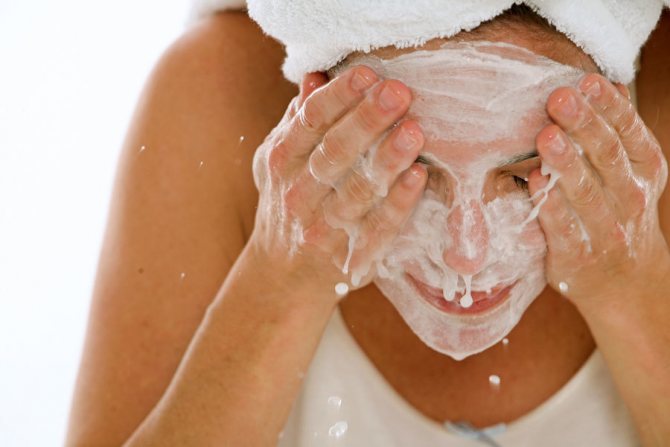
Washing
Aquagenic allergy.
Aquagenic allergy is a rare pathology; in addition to itching, skin rashes may appear. The nature of the phenomenon is unclear, but it may be due to the production of histamine during a cholinergic reaction.
Why does my body still itch after a shower? Often this phenomenon indicates an aquagenic allergy. A very rare pathology, skin rashes are added to the itching. The nature of the phenomenon is unclear. But there is an assumption that this is due to the production of histamine during a cholinergic reaction.
People suffering from this disorder are very careful with water. Since interaction with her, especially long-term, is fraught with unpleasant consequences.
Eliminating factors that cause itching
- Using a special softener filter, sold in stores, you can make the water less hard. Also, bathing water is softened by adding baking soda to it.
- Sometimes allergies can be caused by water at a certain temperature. In this case, it is necessary to wash only with water suitable for the body.
- You should try replacing “aggressive” soap or gel with another product containing softening components (for example, oats or starch).
- Perhaps the itching after a shower will disappear if you change the washcloth to a softer one.
- On a washed body, it is recommended to wear underwear that does not irritate the skin - made of cotton.
- Changing your detergent may help. In any case, clothes should be rinsed thoroughly when washing.
- If you are taking any medications or medications and your skin reacts negatively to them, you should stop taking them.
- You need to pay special attention to your diet. It happens that the skin condition is worsened by eating certain foods (spicy, pickled).
If a person’s body itches after a shower, first of all you need to find out why it happened. We mentioned above that there are many reasons for this phenomenon, from the most harmless urticaria to serious systemic diseases, which without treatment can lead to serious health problems.
One of the preventive measures for itching is proper nutrition. All fried, spicy, salty foods and strong tea and coffee also lead to itching. You need to stop eating unhealthy foods or at least reduce their quantity. A proper diet normalizes the functioning of internal organs and improves your mood. At the same time, you need to consume vitamins, iodine-containing products, and more fruits and vegetables.
You may also need to change your skin care products, as they can also cause irritation. The easiest way is to use hypoallergenic products or baby soap. This will relieve you of allergic problems.
If all preventive measures do not help, you should definitely consult a specialist. The doctor will prescribe the necessary tests that will help determine the cause of the disease, and then prescribe the required treatment. We must not forget about this, since timely diagnosis and properly initiated therapy will help a person live a long life.
Advertisements on NN.RU - For children
Wall mounted book shelf owlets smarty new free delivery within the city of nizhny novgorod dzerzhinsk. The Dastorg factory is selling out - children's. Price: 1,500 rub.
For sale, STM child car seat - used, in good condition, German quality. The car seat is secured with the car's standard seat belt only. Price: 4,000 rub.
The Dastorg factory is selling out - an assortment of children's furniture from Smarty Owls with free delivery throughout the city of Nizhny Novgorod and Dzerzhinsk. Price: 5,500 rub.
Van Cliff companies For growth 152 (up to 156). Color black The quality of the fabric is beyond praise. Worn 1 time per 1 time. Price: 2,000 rubles.
Garbage removal from cemeteries is a long-standing problem in Nizhny Novgorod. For example, on the eve of Victory Day, we wrote about the fact that the people of Nizhny Novgorod.
Imagine, you wake up in the morning, open the curtains, bright sunlight bursts into your apartment, and outside the window is a stunningly beautiful landscape.
Nizhny Novgorod residents are wondering: should we wait for summer this August or should we just come to terms with the fact that autumn has arrived? I don’t know if I’ll be able to please you, but...
“I have never seen Motherland in person. I remember how they talked about it in general terms in history class. But, if you don't.
Many people are familiar with the problem of itching after taking a bath; this symptom can be associated with various diseases of internal organs, allergic reactions to household chemicals, and even with idiopathic aquagenic itching. So patients complain that they itch from simple contact with water. To understand why the body itches after a bath, it is worth understanding the reasons for its occurrence.
Why does my body itch after a bath?
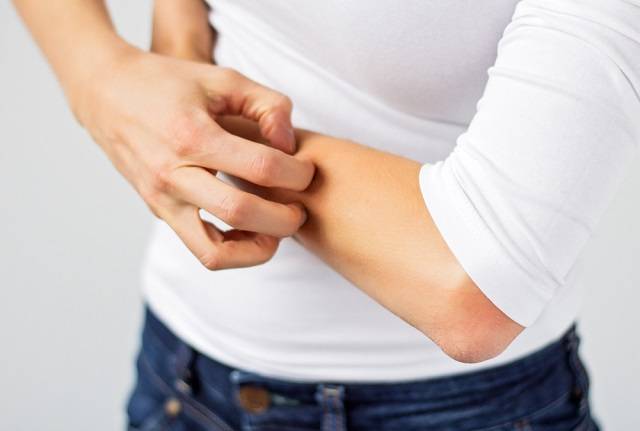
Many people wonder why the skin bakes after a bath. When the body is exposed to high temperature, it heats up, thereby increasing blood pressure and increasing blood circulation in these areas. There is excessive sensitivity and susceptibility to various kinds of irritants.
Why does the body itch after a bath?
- After bath procedures, sensitive skin increases, and a bacterial infection may occur. After all, the pores expand, so they become susceptible to opportunistic microorganisms.
- Therefore, it is advisable for people with sensitive skin to visit the bathhouse as little as possible, because hot air and water help increase the sensitivity of the epidermis.
- Oddly enough, itching can also occur due to taking antimalarial drugs. These are substances that can have side effects one to two weeks after taking them. Indeed, for some time after contact with hot water, unpleasant sensations may occur, which decrease, but at the same time they bother you for another two hours. Once these drugs leave the body, the itching will stop.
Redness
Symptoms and manifestations
In most cases, the authors associate this pathology with the presence of various impurities, such as chlorine and mineral salts, which provoke allergic reactions.
However, if a person reacts to some compound dissolved in water, and in the absence of it calmly takes a shower, then the allergy in this situation is precisely to this substance, and not to water at all. Also, many sources report an increase in the number of people diagnosed with an allergy to water. But experienced allergists, who consult many people every day, do not confirm this information.
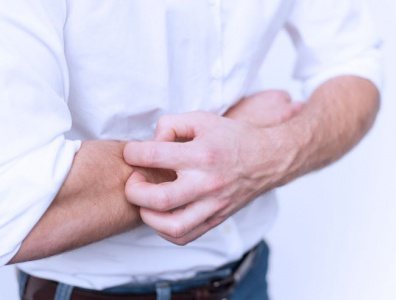
To answer this question, let us remember that an allergy is a perverted reaction of the immune system to some antigen, a substance that the human body for some reason mistakes for a foreign agent. In this case, antibodies begin to be produced to it, called immunoglobulin E by doctors. After interacting with the allergen, when it is re-entered, they form antigen-antibody complexes, which subsequently lead to the destruction of the mast cell membrane with the release of histamine and some other active compounds that are directly responsible for development of allergic manifestations. For one person it is itching and rash, for another it is angioedema, for a third it is an attack of bronchial asthma.
An allergic reaction occurs when the body comes into contact with any, even the smallest, amount of allergen, even if it entered the internal environment of the body several years after the synthesis of immunoglobulin E. Of course, there are other mechanisms for the occurrence of allergies. It participates in various chemical reactions in the body, is located inside each of its cells, and makes up the majority of blood plasma. Let's imagine for a moment that the immune system began to produce antibodies to this compound. How could such a person live? This is why many experts say that it is impossible to develop an allergy to water. Of course, some people develop itchy skin and a rash upon contact with it, but these reactions are not a true allergy.
The symptoms of water allergy, described by most authors on various Internet resources, fit into the clinical picture of aquagenic urticaria provoked by exposure to water. Experts also identify aquagenic itching. This disease is characterized by the appearance of rashes such as urticaria and severe itching after skin contact with water of any temperature. The rash includes small blisters surrounded by red, erythematous patches.
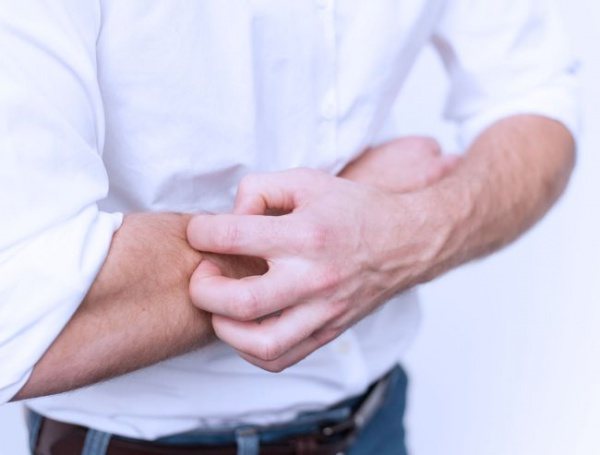
It occurs a few minutes after contact with tap, sea, river, distilled water, and in some people - with their own tears and sweat. For some people, it quickly disappears within minutes, while for others it persists for several hours and days before treatment is prescribed, thereby causing a lot of inconvenience. Experts are still actively discussing the mechanisms of development of this pathological process. However, according to many researchers, the number of degranulated mast cells in the affected area, and...
List of shower gels for sensitive skin
People with very dry, sensitive skin are often recommended to use special products during showering that prevent large amounts of moisture from being removed. They carefully care for the skin and form a film on its surface that prevents the epidermis from drying out. Below we present a list of products for sensitive and atopic dermatitis-prone skin.
List of shower gels for sensitive skin:
- Elfa Pharm. Atopi Med
- Aveeno, For children, treatment of eczema
- SeSDerma Atopises Bath Gel
- Bioderma Atoderm Gentle Shower Gel
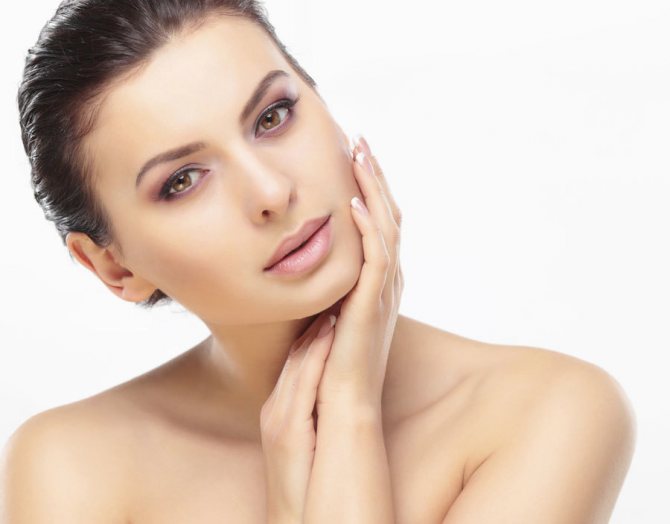
Clean body
Diagnosis and treatment
Examination of internal organs

Treatment of itching after taking a bath is aimed at eliminating the irritating factor in the allergic etiology of the symptom: changing powder, shower gel, soap, household chemicals.
If your feet itch after a bath, all family members are examined for onychomycosis - the toenail is cut off at the skin and venous dispensary and sent for analysis.
Examination of internal organs for pathology or treatment of an established disease, regular taking of medications, correction of lifestyle and nutrition.
In addition, treatment of itching after a bath involves symptomatic therapy:
- Antihistamines: Erius, Telfast, Suprastin.
- Antiallergic cream and ointment: Fenistil (can be used for a child), Gistan, Skin-Cap. Apply a thin layer to the legs, feet, and other areas of the body that itch, with the exception of the mucous membranes.
- Antifungal agents: topically - Lamisil, Mycozoral, orally - Mycozoral, Itrazol.
- Antiparasitic (for scabies): benzyl benzoate, Spregal, Crotamiton. Treat the legs, arms, feet, palms, skin between the fingers, and the abdominal area.
Before starting treatment for an adult or child, it is recommended to examine a specialist to determine the exact reason why the body itches after a bath and to prevent the development of complications.
Never scratch or rub itchy skin. Keep your nails short. Because they can damage your skin. You can apply ice to the itchy area to suppress the urge to scratch. There are various home remedies such as honey and cucumber that you can use to avoid scratches.
There are various herbal remedies for itchy skin. Add some neem leaves in warm water and use the water for bathing. Instead of soap, you can use mung bean powder or milk with turmeric. This helps reduce the itching sensation.
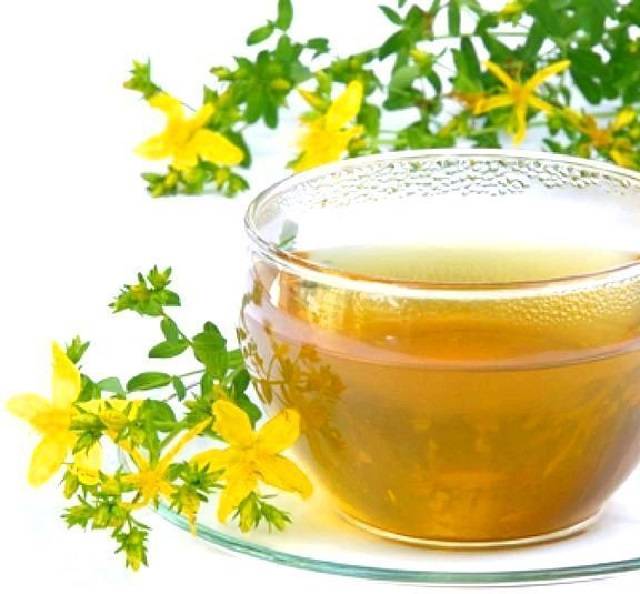
Use antibiotics and antihistamines under the direction of your doctor. They can provide quick relief from allergies and can help relieve symptoms such as increased itching.
Follow a healthy diet to ensure your skin gets the nutrition it needs. Drink plenty of water and fruit and vegetable juices to keep your skin elastic. Stay away from carbonated drinks because they have adverse effects on the skin. Talk to your doctor or dietitian about healthy eating.
Oatmeal bath
An oatmeal bath once a week helps prevent itchy skin. This makes the skin elastic. An oatmeal bath is great for itchy skin.
You should consult your doctor before following any of the above-mentioned treatments because not all home remedies are clinically tested and they may not have the same effect on everyone. Products can help improve the condition of your skin; you just need a little patience.
Use antibiotics and antihistamines under the direction of your doctor. They can provide quick relief from allergies and can help relieve symptoms such as increased itching.
Follow a healthy diet to ensure your skin gets the nutrition it needs. Drink plenty of water and fruit and vegetable juices to keep your skin elastic. Stay away from carbonated drinks because they have adverse effects on the skin. Talk to your doctor or dietitian about healthy eating.
Oatmeal bath
An oatmeal bath once a week helps prevent itchy skin. This makes the skin elastic. An oatmeal bath is great for itchy skin.
You should consult your doctor before following any of the above-mentioned treatments because not all home remedies are clinically tested and they may not have the same effect on everyone. Products can help improve the condition of your skin; you just need a little patience.
Similar
Treatment of itching
To understand how to relieve itching in each specific situation, you should find out its cause. Eliminating this pathogenic cause can largely solve the problem.
If itching after a shower is associated with a reaction to detergents, you should replace them with hypoallergenic or baby soap. Another option is to make your own soap.
The consequences of skin hypersensitivity to chlorinated tap water can be reduced by using the most moisturizing products: hypoallergenic shower gel, baby wash gels. After washing, lubricate the skin with oil creams or skin butters.
If possible, you should install powerful, high-quality filters for tap water.
Antihistamines - tablets, creams and ointments - can help eliminate the symptoms of idiopathic aquagenic pruritus or polycythemia pruritus, since it is caused by elevated histamine levels.
IMPORTANT TO KNOW: An effective remedy for PARASITES has existed for a long time! Follow the link and find out which revolutionary method is recommended by Dr. Sergei Rykov. Read the full article.
Symptomatic itching in chronic diseases is eliminated by treating the underlying disease and this is done by specialists.
Aquagenic pruritus can precede hematological diseases such as polycythemia by many years. Therefore, all persons suffering from itching after contact with water should undergo annual examinations by a hematologist.
I recently encountered this; after taking a shower, my skin was incredibly itchy and itchy, it turned out that it was because of the shower gel, which had expired, now I carefully check all the expiration dates!
Hello! I have a problem: after a shower, my skin stings and itches, but only on my back. After I apply body moisturizer, it gradually calms down. And within 2-3 hours it goes away. But sometimes in the following days the back itches.
My skin always itches in winter after a shower, I thought it was because of the heating of the apartment that my skin dries out and itches
My feet itch after a shower. And only up to the knee, and they itch so much that once I even scratched a red spot until it bled.
After a shower, the skin on my back itches in the area between the shoulder blades, but it goes away in just a couple of minutes.
After a shower, it itches from the throat to the waist... red spots appear and itches. I saw a dermatologist and said that urticaria is in question, she prescribed treatment, it didn’t help, then I saw an allergist, she said that it’s not the right diet, she told me not to eat anything red I also prescribed pills for the chicken, I did it too, it didn’t help, I don’t know what to do... I’ve been suffering for about a year
After a shower, my face “burns” for a long time. Didn't go to doctors. I apply a simple cream, I suffer, I slowly burn)
I’m tearing my legs after a shower, itching to the point of tears, I’m already afraid of everything, I need to take blood tests. This is apparently serious. This didn't happen before.
I spent a long time going through the reasons, and found out that it was the hot water in the shower. Now I only use settled cold water heated on gas, and finally just settled cold water (if desired). I struggled for four years. Efficiency - 90%. When I feel the urge, I apply a little clotrimazole ointment - an excellent inexpensive remedy. On business trips or before celebrations, take 1-2 tablets of suprastin orally (no more than 10 days in a row).
A lot has been said about itching, but little about its treatment!
good to hang noodles! It so happens that every week I rinse myself in the shower in different cities; in Moscow, in the spring and autumn, my whole body is rinsed with water, after it starts to dry out, it itches, I want to comb it, but in other cities this is not the case! Draw your own conclusions
After a shower, my arms, chest and thighs itch terribly on the skin, there is nothing, no redness, creams do not help, what should I do? and maybe it's because of pimples?
I usually have peeling in winter, but last year it was somehow worse than usual.
With conjunctivitis, the eyes always itch and water, among other things.
Recently, my eyes suddenly began to itch, they itched quite badly, and they also turned red. .
One evening my eyes itched and turned a little red, I...
